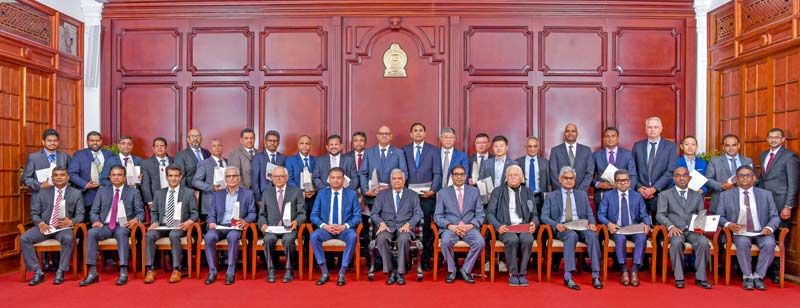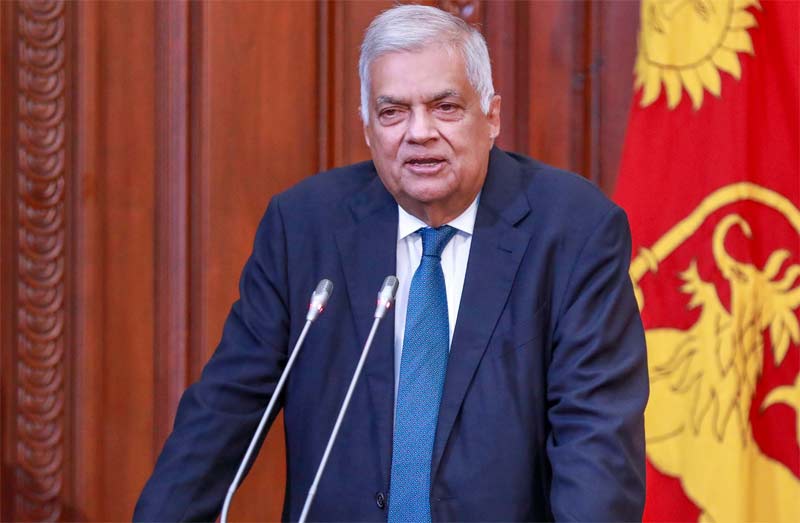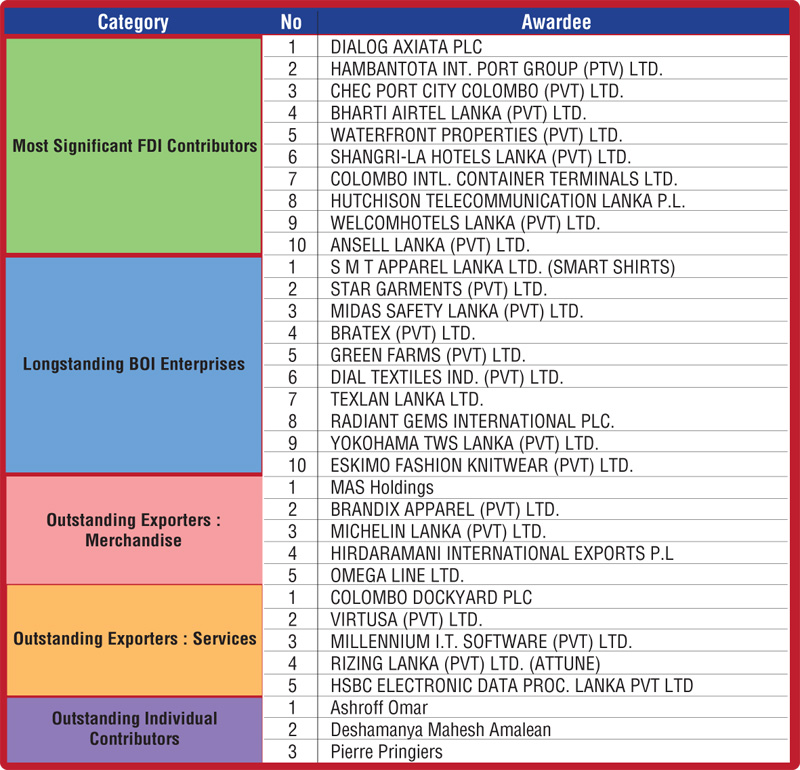Wednesday Feb 25, 2026
Wednesday Feb 25, 2026
Thursday, 4 April 2024 03:51 - - {{hitsCtrl.values.hits}}

Winners of Board of Investments awards on Tuesday at Presidential Secretariat

President Ranil Wickremesinghe
President Ranil Wickremesinghe, on Tuesday, wooed Board of Investment approved and overseas firms to get their investments ready as Sri Lanka will herald its next growth wave with stability restored. He made this observation during his address at the first-ever awards ceremony organised by the BOI marking its 45th anniversary at the Presidential Secretariat. “Despite the turbulent period, we successfully stabilised the economy in under two years, a feat we continue to uphold.
Notably, we have transitioned away from relying solely on the Central Bank for economic stability, opting instead to engage directly with the market,” the President said. “Our next endeavour is to evolve into a highly competitive, export-oriented economy—a transformation projected to span a decade or more. Our focus now lies in attracting competitive investments, fostering a business-friendly environment, and enhancing the nation›s economic competitiveness,” emphasised Wickremesinghe. The ceremony saw 30 awards presented to deserving companies and individuals for their noteworthy contributions to foreign direct investment and export performance, as well as recognising longstanding active participants. A rigorous evaluation process was undertaken to ensure merit. The President bestowed honour to individual contributions to the Sri Lankan economy with recipients being Brandix Group CEO Ashraf Omar, MAS Holdings Co-Founder and Chairman Mahesh Amalean, and Sail Lanka Yacht Group Chairman Pierre Pringiers. President Wickremesinghe personally conferred these accolades, acknowledging their significant impact on the nation›s economic landscape. He also thanked all the investors under the BOI for their persistence despite challenges. BOI Chairman Dinesh Weerakkodi presented a photograph capturing the inauguration of the Biyagama Investment Zone in 1981 to the President as a token of remembrance.
Wickremesinghe was the Industries Minister at that time under the Government led by President J.R. Jayewardena and Prime Minister Ranasinghe Premadasa. In his address, Wickremesinghe affirmed his commitment to bolstering the nation›s economy through the establishment of competitive investment avenues. He commended the pivotal role played by companies under the purview of the Board of Investment in driving Sri Lanka›s economic growth. Reflecting on Sri Lanka›s pioneering role in establishing Special Economic Zones (SEZs) in South Asia, he highlighted the success of investment zones such as Katunayake and Biyagama. He emphasised their achievement in attracting significant investors, fostering industrial development, and generating employment opportunities. Expressing his views at this event, President Ranil Wickremesinghe said; “It has been 45 years since the establishment of the Board of Investment in our country. In 1977, President J.R. Jayawardena made the decision to liberalise a segment of our economy. Recognising that a portion of the economy had been tightly regulated and controlled, he opted for a gradual approach to opening it up. Consequently, the Greater Colombo Economic Zone was formed under his initiative. I distinctly recall advocating for the inclusion of Biyagama in this endeavour. Subsequently, in January 1978, the necessary legislation was enacted. This marked the genesis of the Katunayake Investment Zone, emerging from the transformation of a coconut estate in Katana. The establishment of the Biyagama Investment Zone faced scepticism from the United Nations Industrial Development Organisation (UNIDO), which deemed it unfeasible. However, the engineers at the Board of Investment persisted, demonstrating that it was indeed achievable. Thus, the Biyagama Investment Zone came into existence. Prior to the creation of the Biyagama Zone, there was already a factory operating in Biyagama, namely Baganon Lanka. Mr. Pringiers, associated with this venture, used to frequent my office at that time, located nearby in Sapugaskanda. The initiation of these zones marked the beginning of a journey fraught with challenges. From contending with the LTTE conflict to confronting the Janatha Vimukthi Peramuna (JVP) insurgency, the security of these zones demanded rigorous measures, including thorough inspections of all individuals entering and exiting. Despite these adversities, we persevered, emerging unscathed from both the war and the economic turmoil of the past two years. I extend my heartfelt gratitude to all those who have been part of this journey, both longstanding contributors and newcomers alike. Subsequently, President Premadasa embarked on a mission to establish 200 apparel factories, initially commencing with 100. Recognising the need to expand beyond designated zones, this endeavour was entrusted to the Board of Investment, leading to the proliferation of garment factories across the nation. The establishment of these 200 apparel factories stands as a monumental achievement for us all. This period of development was characterised by incremental progress, with factories being inaugurated week by week. Over the course of 15 years, we witnessed the transformation of our nation, marked by the creation of a new capital, the Mahaweli development project, housing schemes, and the establishment of 200 apparel factories, among other milestones. We embarked on a journey of industrial expansion, inaugurating factories week after week. This was the cornerstone of our developmental efforts during that era. Alongside, we undertook ambitious projects such as the establishment of a new capital and the inception of the Mahaweli Movement. Housing schemes also took root, marking our commitment to nationwide development within a span of 15 years. Recent times presented formidable challenges, yet collectively, we rose to the occasion admirably. Now, our focus must shift towards rebuilding economic confidence across all sectors. Despite the turbulent period, we successfully stabilised the economy in under two years, a feat we continue to uphold. Notably, we have transitioned away from relying solely on the central bank for economic stability, opting instead to engage directly with the market. Our next endeavour is to evolve into a highly competitive, export-oriented economy—a transformation projected to span a decade or more. Consequently, the role of the Investment Board will undergo a metamorphosis into a comprehensive Economic Commission. Under this new paradigm, we envision a singular investment zone encompassing the entirety of Sri Lanka, with investors assuming the mantle of licensees. Within this framework, investors will have the autonomy to develop and manage their own zones. Presently, we possess approximately a thousand acres in the Biyagama region, with plans to acquire three to four thousand acres in Trincomalee, complemented by similar ventures in the north and Hambantota. Infrastructure development is thus a top priority. Our focus now lies in attracting competitive investments, fostering a business-friendly environment, and enhancing the nation›s economic competitiveness. Concurrently, we are revolutionising the professional training landscape, phasing out vocational training centres in favour of vocational colleges. This transition ensures that students receive due recognition as they progress from school to vocational college and beyond. Additionally, discussions are underway regarding the establishment of new junior technical cities, with plans in motion to create at least three or four such cities. We are steadfast in our commitment to advancing the digital economy. To this end, we will establish a new digital exchange agency and allocate funding for Artificial Intelligence (AI) initiatives. Additionally, our agricultural modernisation program aims to cultivate an additional 500,000 acres of land over the next decade, supplementing existing cropland and fostering highly productive agriculture. Furthermore, plans are underway to position Sri Lanka as a prominent supply chain hub. However, the realisation of these ambitions hinges upon your continued trust in Sri Lanka, as well as ongoing investment from both domestic and foreign stakeholders.”
